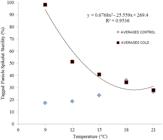ABSTRACT
This study evaluated the effect of temperatures during the phase of microsporogenesis on spikelet sterility of paddy rice and identified genotypes tolerant to low temperatures at this growth stage. The inbreds SC681, SC491, and SC676 and the cultivars Epagri 109 and SCS116 Satoru were assessed. The genotypes were submitted for three days in a growth chamber to five temperatures at microsporogenesis: 9, 12, 15, 18, and 21 oC. For each tested temperature, a control was kept in the greenhouse under environmental conditions. After harvest, full and empty spikelets were counted and weighed and the percentage of spikelet sterility was determined. Data were evaluated by variance analysis using the F test. Averages were compared by Tukey’s test and regression analysis. The highest spikelet sterilities were observed when the genotypes were exposed to the temperatures of 9 and 12 oC. Genotype spikelet sterility was similar to that of the control at 21 ºC. The inbred SC 676 presented higher tolerance to lower temperatures is therefore potentially suited to generate a cultivar with adequate agronomic performance in rice growing areas prone to cold conditions at microsporogenesis.
Key words:
Oryza sativa; booting; cold; controlled environment

 Thumbnail
Thumbnail
 Thumbnail
Thumbnail

